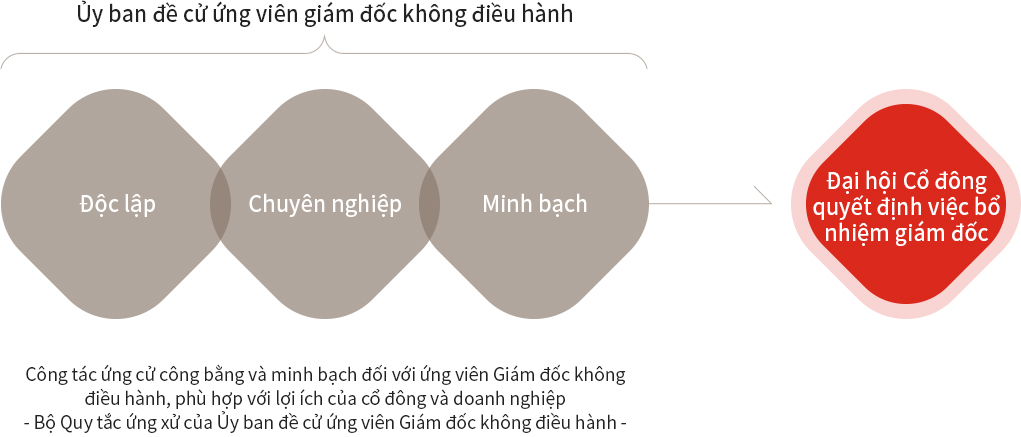Article 5 (Number of Total Authorized Shares)
The number of total authorized shares to be issued by the
Company shall be 500,000,000 shares.
Article 6 (Par Value per Share)
The par value per share to be issued by the Company shall be
KRW 200.
Article 7 (Classes of Shares)
The classes of the shares to be issued by the Company shall
be common shares in a registered form and preferred shares in a registered
form.
Article 7-2 (Number and Terms of Class 1 Preferred Shares)
- (1) The class 1 preferred shares to be issued by the Company shall be
non-voting shares with preferred dividend rights (the “Class 1 Preferred
Shares”), and the number of the Class 1 Preferred Shares shall be
750,000 shares.
- (2) The dividends on the Class 1 Preferred Shares shall be not less than
nine percent (9%) per annum based on the par value, and the rate thereof
shall be determined by the Board of Directors at the time of issuance.
- (3) If the dividend rate declared on common shares exceeds that on the
Class 1 Preferred Shares, the shareholders holding the Class 1 Preferred
Shares shall be entitled to such excess, which shall be distributed on a
pro rata basis to all common shares and Class 1 Preferred Shares.
- (4) If, for any fiscal year, dividends have not been paid on the Class 1
Preferred Shares at the dividend rate prescribed herein, such unpaid
dividends shall be paid first on a cumulative basis at the time of
payment of dividends for the subsequent fiscal year.
- (5) In the event a resolution has been passed at a meeting of
shareholders of the Company that dividends on the Class 1 Preferred
Shares shall not be paid as prescribed herein, the shareholders holding
the Class 1 Preferred Shares shall be granted voting rights at the
meetings of shareholders convened following the aforesaid meeting until
and including the meeting of shareholders at which a resolution is
passed in favor of payment of the dividends on the Class 1 Preferred
Shares.
- (6) If the Company increases its capital by a rights issue or bonus
issue, the new shares to be allotted to the Class 1 Preferred Shares
shall be common shares in case of a rights issue and shares of the same
type in case of a bonus issue.
- (7) The term of the Class 1 Preferred Shares shall be ten (10) years
from the date of issuance, and the Class 1 Preferred Shares shall be
converted to common shares upon the expiration of such term. However, if
the preferred dividends have not been paid by the Company as prescribed
herein during the said term, the aforementioned term shall be extended
until such unpaid dividends shall have been paid in full. In such case,
Article 11 shall apply mutatis mutandis to the payment of dividends on
the shares issued upon conversion.
Article 7-3 (Number and Terms of Class 2 Preferred Shares)
- (1) The class 2 preferred shares to be issued by the Company shall be
non-voting shares with preferred dividends (the “Class 2 Preferred
Shares”), and the number of the Class 2 Preferred Shares shall not be
more than 3,000,000 shares.
- (2) The dividends on the Class 2 Preferred Shares shall be the sum of
the dividends paid on common shares and the amount calculated at the
rate as determined by the Board of Directors at the time of issuance
based on the par value. The rate may be determined, considering all
circumstances such as the previous dividend rates, necessity of securing
funding and market conditions, etc.
- (3) If no dividend is paid on the common shares, the Company may decide
not to pay dividends on the Class 2 Preferred Shares as well.
- (4) In the event the Company is unable to pay the dividends on Class 2
Preferred Shares as prescribed herein from the profits of the relevant
fiscal year and a resolution is adopted at a meeting of shareholders not
to pay dividends on the Class 2 Preferred Shares, the shareholders
holding the Class 2 Preferred Shares shall be granted voting rights at,
and until the close of, the meeting of shareholders convened following
the aforesaid meeting.
- (5) If the Company increases its capital by a bonus issue and issues
class shares with respect to the Class 2 Preferred Shares, the Class 1
Preferred Shares set forth in Article 7-2 shall be allotted thereto.
Article 8 (Types of Share Certificates)
The share certificates of the Company shall be issued in the
following eight (8) denominations: one (1), five (5), ten (10), fifty (50),
one hundred (100), five hundred (500), one thousand (1,000) and ten thousand
(10,000) shares.
Article 9 (Issuance and Allotment of Shares)
- (1) In the event the Company issues new shares by a resolution of the
Board of Directors, it shall be by one of the following methods:
- 1. granting the shareholders an opportunity to subscribe for new
shares in order to allot new shares to them in proportion to
their respective shareholdings
- 2. granting certain persons (including the shareholders of the
Company) an opportunity to subscribe for new shares in order to
allot new shares to such persons by a method other than Item 1
above, to the extent that the number of such new shares does not
exceed twenty percent (20/100) of the total number of issued and
outstanding shares and it is deemed necessary to achieve the
Company’s managerial purpose such as acquisition of new
technology or improvement of the Company’s financial structure;
or
- 3. granting a number of unspecified persons (including the
shareholders of the Company) an opportunity to subscribe for new
shares by a method other than from Item 1 above, to the extent
that the number of such new shares does not exceed fifty percent
(50/100) of the total number of issued and outstanding shares
and allotting new shares to the persons who subscribed for new
shares as above.
- (2) In case of allotting new shares by the method set forth in Paragraph
(1), Item 3 above, new shares shall be allotted by one of the following
methods by a resolution of the Board of Directors:
- 1. allotting new shares to a number of unspecified persons
without classifying the types of persons who will be granted an
opportunity to subscribe for new shares
- 2. allotting new shares to the members of the Employees Share
Ownership Association pursuant to the applicable laws and
regulations, and granting a number of unspecified persons an
opportunity to subscribe for new shares which are not so
subscribed for (if any)
- 3. granting the shareholders a priority opportunity to subscribe
for new shares, and then granting a number of unspecified
persons an opportunity to subscribe for new shares which are not
so subscribed for (if any); or
- 4. granting a certain type of persons an opportunity to
subscribe for new shares in accordance with the reasonable
standards prescribed by investment traders or investment brokers
acting as an underwriter or an intermediary in accordance with
the applicable laws and rules, such as demand forecast.
- (3) Notwithstanding Paragraphs (1) and (2) above, if the Company
receives from the shareholders of Subsidiaries, Etc. or other companies
issued and outstanding shares in such companies as in-kind contribution
in order to (i) comply with the requirements or conditions applicable to
a holding company under the Monopoly Regulation and Fair Trade Act, (ii)
carry out the business of holding shares or ownership interests or (iii)
acquire subsidiaries or shares thereof, the Company may allot new shares
to the persons holding the shares of such companies (including the
shareholders of the Company) by a resolution of the Board of Directors
- (4) In case of allotting new shares by the method set forth in Paragraph
(1), Item 2 or 3, the Company shall give a public notice or give notice
to the shareholders on the matters prescribed in Article 416, Items 1,
2, 2-2, 3 and 4 of the Korean Commercial Code (the “KCC”) at least two
(2) weeks prior to the relevant due payment date; provided, however,
that the Company may publish a report on material facts at the Financial
Service Commission and the Korea Exchange pursuant to Article 165-9 of
the Financial Investment Services and Capital Markets Act (the “FSCMA”)
in lieu of such public notice or notice to the shareholders.
- (5) In issuing new shares by a method set forth in Paragraph (1) above,
the type, number and the issuance price, etc. of the shares to be issued
shall be determined by a resolution of the Board of Directors.
- (6) If there remain shares which have not been subscribed for or paid
for until the due date after allotment, the method of dealing with such
new shares shall be determined by a resolution of the Board of Directors
in accordance with the applicable laws and regulations, including those
on the adequacy of the issuance price.
- (7) If there are any fractional shares resulted in the course of
allotting new shares, the method of dealing with such fractional shares
shall be determined by a resolution of the Board of Directors.
- (8) In issuing new shares pursuant to Paragraph (1), Item 1 above, the
Company shall issue to the shareholders the certificate of preemptive
right to new shares.
Article 10 (Stock Options)
- (1) The Company may grant stock options to its officers and employees
(which shall include, for the purpose of this Article, officers and
employees of related companies as prescribed in Article 30 of the
Enforcement Decree of the KCC) by a special resolution of the General
Meeting of Shareholders, to the extent not exceeding fifteen percent
(15/100) of the number of total issued and outstanding shares of the
Company; provided, however, that the Company may grant stock options to
the officers and employees excluding the board members of the Company,
by a resolution of the Board of Directors, to the extent not exceeding
one percent (1/100) of the number of total issued and outstanding
shares. If the Company grants stock options by a resolution of the Board
of Directors, the Company shall obtain the approval of the General
Meeting of the Shareholders that is convened immediately after granting
of such stock options. Stock options granted by a resolution of the
General Meeting of Shareholders or the Board of Directors may be linked
to the performance of the Company measured by business performance
targets or market indices.
- (2) The persons who are entitled to receive such stock options shall be
officers and employees who have contributed, or are capable of
contributing, to the incorporation, management, overseas sales or
technological innovation, etc. of the Company.
- (3) The shares to be delivered upon the exercise of stock options (in
the event the Company settles the difference between the exercise price
of the stock options and the fair value of the shares to be delivered by
cash or treasury shares, the share whose fair value to be appraised)
shall be selected among the types of shares set forth in Article 7
hereof, by a resolution of the General Meeting of Shareholders or the
Board of Directors granting such stock options.
- (4) The exercise price per share for the stock option shall be equal to
or higher than the amount calculated pursuant to the following
subparagraphs, and the same shall apply when adjusting the exercise
price after the grant of the stock option.
- 1. In case of delivering newly issued shares, the higher of the
following:
A. the fair value of the share of the Company as of the date of
granting the stock option; or
B. the par value of the share.
- 2. In case of delivering treasury shares of the Company, the
fair value of the share of the Company as of the date of
granting the stock option.
- (5) Stock options granted hereunder may be exercised at least two (2)
years after the date of the resolution made pursuant to Paragraph (1)
above and within ten (10) years therefrom.
- (6) The grantee of a stock option may exercise the stock option only if
he or she shall have served the Company for at least two (2) years from
the date of the resolution under Paragraph (1) above; provided, however,
that if the said grantee deceases or retires or resigns from the Company
due to any reason not attributable to him/her within two (2) years from
the date of the resolution under Paragraph (1) above, such stock option
may be exercised within the exercise period.
- (7) With regard to the distribution of dividends on shares issued upon
the exercise of stock options, the provision of Article 11 hereof shall
apply mutatis mutandis.
- (8) In any of the following cases, the Company may revoke the grant of
stock options by a resolution of its Board of Directors:
- 1. if the officer or employee granted the stock option
voluntarily retires or resigns;
- 2. if the officer or employee granted the stock option causes
material damage to the Company by willful misconduct or
negligence;
- 3. if the Company is unable to perform its obligations upon the
exercise of stock options due to bankruptcy, dissolution, etc.;
or
- 4. if any other event occurs that is stipulated as a ground for
revocation in the Stock Option Grant Agreement.
Article 11 (Record Date for Dividends on New Shares)
If the Company issues new shares as a result of capital
increase with or without payment for the shares or as stock dividend, for
the purpose of calculating the accrual of dividends on the new shares, such
new shares may be deemed to have been issued at the end of the fiscal year
immediately preceding the fiscal year during which such new shares are
issued by a resolution of the Board of Directors.
Article 12 (Transfer Agent)
- (1) The Company shall designate a transfer agent for shares.
- (2) The transfer agent, its place of business and the scope of its
agency work scope shall be determined by a resolution of the Board of
Directors, and such facts shall be publicly notified.
- (3) The shareholders registry or duplicates thereof shall be kept at the
business place of the transfer agent. The alterations in the registry of
shareholders, registration of creation or cancellation of pledges over
shares, registration of trust assets or cancellation thereof with
respect to shares, issuance of share certificates, receipt of reports
and other related matters shall be conducted by the transfer agent.
- (4) The procedures applicable to the tasks provided for in Paragraph (3)
above shall be conducted in accordance with the Regulation on Securities
Transfer Agency Business of Transfer Agent, Etc.
Article 13 (Report of Addresses, Names and Seals or Signatures of
Shareholders, Etc.)
- (1) Shareholders and registered pledgees shall report their names,
addresses, and seals or signatures to the transfer agent set forth in
Article 12 above.
- (2) A shareholder or registered pledgee who resides in a foreign country
shall report to the Company the appointed agent to receive notices and
the addresses in Korea to which notices are to be sent.
- (3) The same shall apply in case of any changes in the matters referred
to in Paragraphs (1) and (2) above.
Article 14 (Suspension of Altering Entry in Shareholders Registry and
Record Date)
- (1) The Company shall suspend entries of alteration in the shareholders
registry from the 1st to the 15st of January of each year.
- (2) The shareholders registered in the shareholders registry as of the
last day of each fiscal year shall be entitled to exercise the rights as
shareholders at the Ordinary General Meeting of Shareholders convened
with respect to such fiscal year.
- (3) The Company may suspend entry of any alterations in the shareholders
registry for a period not exceeding three (3) months or set a record
date, after giving at least two (2) weeks’ prior public notice thereof,
by a resolution of the Board of Directors, if necessary to convene an
Extraordinary General Meeting of Shareholders or otherwise; provided,
however, that the Board of Directors may decide the suspension of entry
of any alterations in the shareholders registry and a record date at the
same time, if deemed necessary.














